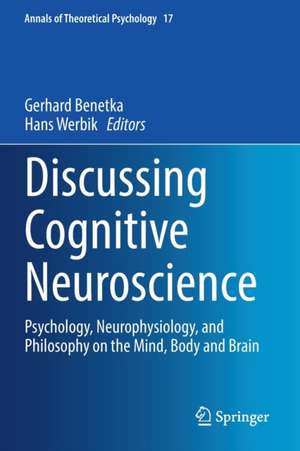Discussing Cognitive Neuroscience: Psychology, Neurophysiology, and Philosophy on the Mind, Body and Brain: Annals of Theoretical Psychology, cartea 17
Autor Gerhard Benetka, Hans Werbiken Limba Engleză Paperback – 23 mai 2022
| Toate formatele și edițiile | Preț | Express |
|---|---|---|
| Paperback (1) | 481.43 lei 6-8 săpt. | |
| Springer International Publishing – 23 mai 2022 | 481.43 lei 6-8 săpt. | |
| Hardback (1) | 584.58 lei 6-8 săpt. | |
| Springer International Publishing – 22 mai 2021 | 584.58 lei 6-8 săpt. |
Din seria Annals of Theoretical Psychology
- 20%
 Preț: 630.75 lei
Preț: 630.75 lei - 5%
 Preț: 1109.23 lei
Preț: 1109.23 lei - 18%
 Preț: 956.18 lei
Preț: 956.18 lei - 15%
 Preț: 648.05 lei
Preț: 648.05 lei - 15%
 Preț: 646.62 lei
Preț: 646.62 lei - 20%
 Preț: 589.83 lei
Preț: 589.83 lei - 15%
 Preț: 645.14 lei
Preț: 645.14 lei - 15%
 Preț: 523.91 lei
Preț: 523.91 lei - 18%
 Preț: 892.59 lei
Preț: 892.59 lei -
 Preț: 394.29 lei
Preț: 394.29 lei - 15%
 Preț: 644.63 lei
Preț: 644.63 lei -
 Preț: 385.08 lei
Preț: 385.08 lei - 18%
 Preț: 955.56 lei
Preț: 955.56 lei - 15%
 Preț: 585.69 lei
Preț: 585.69 lei - 15%
 Preț: 646.43 lei
Preț: 646.43 lei -
 Preț: 386.61 lei
Preț: 386.61 lei
Preț: 481.43 lei
Nou
Puncte Express: 722
Preț estimativ în valută:
92.12€ • 96.38$ • 76.53£
92.12€ • 96.38$ • 76.53£
Carte tipărită la comandă
Livrare economică 02-16 aprilie
Preluare comenzi: 021 569.72.76
Specificații
ISBN-13: 9783030710422
ISBN-10: 3030710424
Ilustrații: VII, 171 p. 3 illus.
Dimensiuni: 155 x 235 mm
Greutate: 0.27 kg
Ediția:1st ed. 2021
Editura: Springer International Publishing
Colecția Springer
Seria Annals of Theoretical Psychology
Locul publicării:Cham, Switzerland
ISBN-10: 3030710424
Ilustrații: VII, 171 p. 3 illus.
Dimensiuni: 155 x 235 mm
Greutate: 0.27 kg
Ediția:1st ed. 2021
Editura: Springer International Publishing
Colecția Springer
Seria Annals of Theoretical Psychology
Locul publicării:Cham, Switzerland
Cuprins
Chapter 1. Critique of neuropsychology – A polemic.- Chapter 2. Living body (Leib) or physical dataset? Antonio Damsio’s and Thomas Fuchs’s holistic conception of the human being as opposite standpoint to reductionist models.- Chapter 3. The person and the brain.- Chapter 4. The neuropsychological discourse in philosophical critique - Bennett/Hacker and the consequences.- Chapter 5. Persistent biologism and the misuse of neuropsychology – an activity-theoretical contribution.- Chapter 6. Measuring free will with the readiness potential? New data on an old misunderstanding.- Chapter 7. The brain as protagonist – Without the brain all is nothing.- Chapter 8. Is it possible to simulate “thought”?
Notă biografică
Gerhard Benetka
Born 1962 in Vienna, studies of psychology, history and sociology at University of Vienna; Master’s degree (Mag.phil.) 1989, PhD (Dr.phil.) 1994; authorisation to teach (venia docendi) for the subject of psychology 1998; visiting professorships in Vienna, Innsbruck, Graz, Klagenfurt and in the Principality of Liechtenstein; since 2007 full professor at Sigmund Freud University; since 2015 Dean of the Faculty of Psychology and chair of the academic senate.
Hans Werbik
Born 1941 in Hollabrunn (Lower Austria), studies of psychology and musicology at University of Vienna; PhD (Dr.phil.) 1963; 1963-1965 psychologist at the Institute of Empirical Social Research in Vienna; 1965-1969 research assistant at the Institute of Psychology at the University of Tübingen; authorisation to teach (venia docendi) for the subject of psychology 1969; 1970-1973 professor, since 1973 full professor at the Institute ofPsychology at University of Erlangen-Nuremberg; since 2006 emeritus professor; since 2015 university lecturer at Sigmund Freud University.
Hans Werbik
Born 1941 in Hollabrunn (Lower Austria), studies of psychology and musicology at University of Vienna; PhD (Dr.phil.) 1963; 1963-1965 psychologist at the Institute of Empirical Social Research in Vienna; 1965-1969 research assistant at the Institute of Psychology at the University of Tübingen; authorisation to teach (venia docendi) for the subject of psychology 1969; 1970-1973 professor, since 1973 full professor at the Institute ofPsychology at University of Erlangen-Nuremberg; since 2006 emeritus professor; since 2015 university lecturer at Sigmund Freud University.
Textul de pe ultima copertă
The sciences philosophy, psychology and neuroscience share the basis that all refer to the human being. Therefore, an interdisciplinary collaboration would be desirable. The exchange of criticism is an essential requirement for interdisciplinary collaboration. Criticism must be heard and – if possible – considered. Indeed, criticism can be valid or unwarranted. However, whether criticism is unwarranted can only emerge from discussion and conversation. In the discussion of cognitive neuroscience, some criticism can easily be considered (such as the mereological fallacy that represents that talking about the person is substituted with talking bout the brain). Another issue for an interdisciplinary discussion of cognitive neuroscience is the interpretation of the readiness potential including re-considering Benjamin Libet’s classic experiments. Additionally, a critical discussion on cognitive neuroscience must address ethical questions, such as the possibility of the abuse of neuroscientific insight.
Caracteristici
Main points of criticism against the generalizations of neuroscientific research are explained The viewpoint of phenomenological psychology, which is less common in the US-American discussion, is presented in detail Against all philosophical criticism, the significance of neuroscientific research for psychology from the perspective of biological psychologists is also presented New and original experiments to reinterpret the Libet experiment are presented
